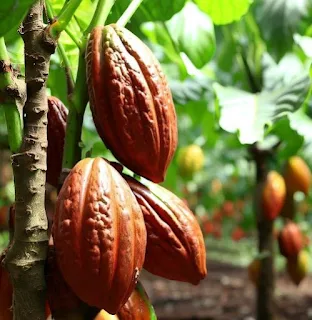Bitter Sweet: The Complexities of Cocoa Farming in Africa
Your chocolate craving has a global impact.
 |
| Drying cocoa beans in the sun in Ghana Olam processing |
The Importance of Cocoa Farming in Ghana
Ghana’s role as one of the largest cocoa-producing countries highlights the significance of cocoa farming in its economy and culture.
Small-Scale Farmers and Traditional Farming Methods
Cocoa farming in Ghana is primarily undertaken by small-scale farmers who use traditional methods like hand pruning and harvesting, often relying on family labor.
Intercropping: A Strategy for Income and Food Security
Farmers in Ghana often grow cocoa alongside crops like plantains and maize, enhancing food security and generating additional income.
The Complex Cocoa Supply Chain in Ghana
The journey of cocoa beans involves multiple actors, including local buyers, licensed buying companies (LBCs), and the Ghana Cocoa Board (COCOBOD), which regulates the sector.
COCOBOD’s Role in Pricing and Regulation
COCOBOD sets seasonal prices for cocoa beans, ensuring LBCs purchase from farmers at a standardized rate, though market volatility affects farmers’ income.
Exporting Ghanaian Cocoa to Global Markets
After processing, the majority of Ghanaian cocoa is exported to Europe, where it is transformed into chocolate and other products.
Challenges Facing Cocoa Farmers in Ghana
Farmers encounter obstacles such as low productivity due to aging trees, disease, poor soil fertility, and limited access to credit, inputs, and technical support.
Addressing Child Labor and Forced Labor in Cocoa Farming
Efforts to combat child and forced labor include child labor monitoring systems and community-based initiatives, though challenges persist.
Sustainable Cocoa Production Initiatives in Ghana
Programs like the Cocoa Abrabopa Association (CAA) and the World Cocoa Foundation’s CocoaAction aim to improve productivity, farmer livelihoods, and sustainability.
These headings provide a logical structure to the content, enhancing readability and SEO optimization.
Cocoa Farming in Ghana: A Vital Industry
Cocoa farming plays a crucial role in Ghana, providing income and livelihoods for thousands of small-scale farmers. Despite the complexities and challenges within the cocoa supply chain, various initiatives aim to promote sustainable cocoa production and improve farmers' lives. Supporting these efforts and choosing ethically sourced cocoa products can contribute to a more sustainable and equitable cocoa industry.
About Olam and Cocoa
The Role of Olam in the Cocoa Industry
Cocoa farming is often invisible to consumers, yet it is essential in producing the sweet treats enjoyed worldwide. Olam International Limited is a major player in the cocoa processing sector, turning raw cocoa beans into ingredients like powder, liquor, and butter that are used in confectionery products.
Overview of Olam International Limited
Olam International Limited is a leading global food and agri-business company. Operating in 60 countries with over 80 processing facilities, Olam supplies food ingredients, feed, and fiber to customers worldwide. It is headquartered in Singapore and listed as one of the top 30 companies on the Singapore Exchange. Olam is also a Fortune Global 500 company and a member of the FTSE4Good Index Series.
Olam’s Organizational Structure and Goals
Olam is undergoing a re-organization to form three distinct operating groups: ofi, Olam Agri, and the Remaining Businesses of Olam Group. Olam’s purpose is to re-imagine global agriculture and food systems, aiming to deliver sustainable solutions that benefit people, the planet, and prosperity. By 2040, Olam aspires to be the most differentiated and valuable global food and agri-business.
Olam’s Values and Strategic Pathways
Olam’s core values—integrity, ownership, teamwork, mutual respect, continuous improvement, and customer focus—guide its operations. Its strategic pathways include pursuing growth opportunities, enhancing efficiency, driving sustainability impact, and building trust with stakeholders.
Olam's Cocoa Operations
Acquisition of Archer Daniels Midland’s Cocoa Business
In 2014, Olam International Limited acquired Archer Daniels Midland Company’s global cocoa business for $1.3 billion, expanding its role in the cocoa industry. Olam is now one of the world’s largest suppliers and processors of cocoa beans, powders, masses, and butters. The company operates in over 70 countries, including cocoa sourcing operations in Africa.
Environmental Criticism and Efforts Toward Sustainability
Olam has faced criticism for purchasing cocoa linked to deforestation, particularly in Côte d’Ivoire. These cocoa beans, known as "dirty beans," have raised concerns about environmental damage. However, Olam has committed to achieving 100% traceable and sustainable cocoa volumes by 2020, aiming to improve its sourcing practices.
Olam's Commitment to Cocoa Farming Communities
Olam works with various partners, including governments, NGOs, and other stakeholders, to create sustainable conditions for cocoa farmers. The company’s efforts include initiatives like providing shade trees in Ghana to support forest conservation and improve environmental conditions for farmers.
The Importance of Sustainable Cocoa Farming in Africa
Cocoa's Role in Africa and the Global Supply Chain
With Africa producing around 70% of the world’s cocoa, it is the backbone of the global supply chain. Olam sources cocoa from several African countries, including Côte d’Ivoire, Ghana, Nigeria, Cameroon, and Uganda. Despite its importance, cocoa farming faces several challenges, including aging trees, soil degradation, and labor issues.
Addressing Sustainability Challenges in Cocoa Production
Sustainability initiatives are essential for tackling these challenges and improving cocoa farmer productivity. Efforts to promote ethical practices and sustainable solutions are crucial to ensuring the long-term viability of the cocoa industry in Ghana and beyond.
Conclusion: The Need for Ethical and Sustainable Cocoa Practices
While Olam has made progress in promoting sustainability, the cocoa industry still faces significant challenges, including environmental concerns and ethical sourcing. It is vital for stakeholders to continue supporting initiatives that drive sustainability and improve the livelihoods of cocoa farmers.







